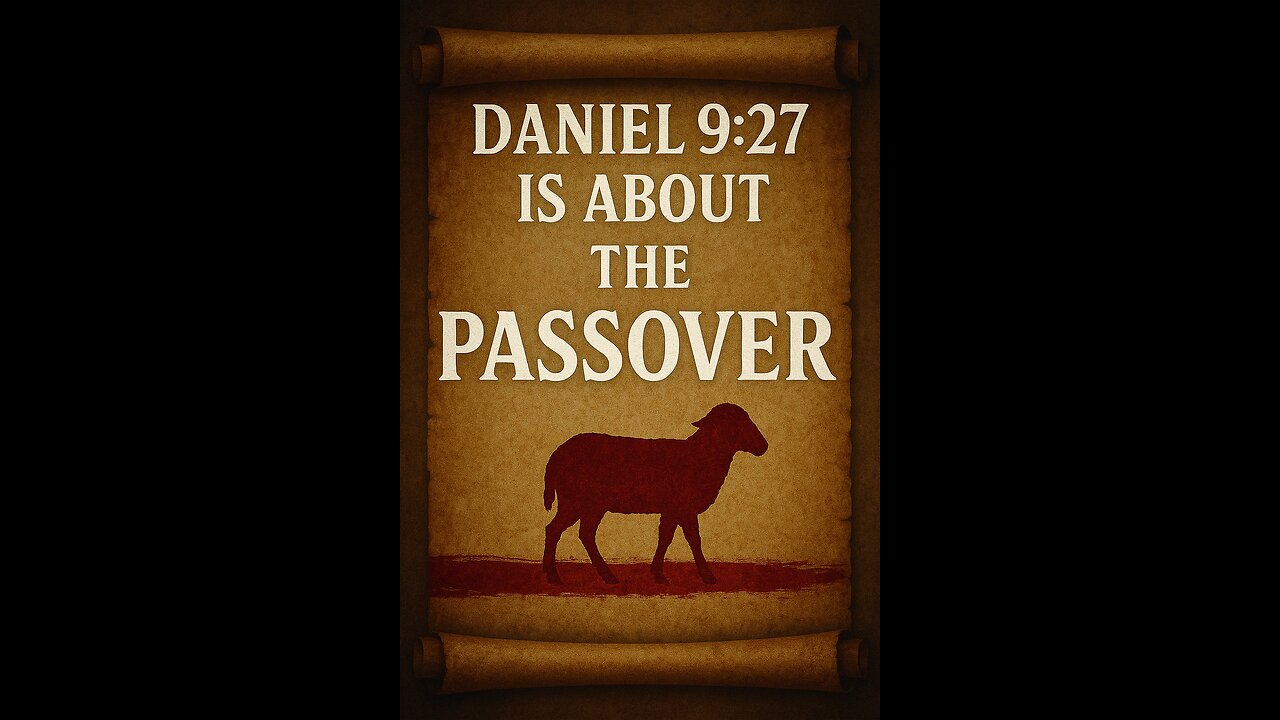Premium Only Content

Daniel 9:27 is about The Passover
Daniel 9:27 is about the Passover. Also I may go over past debates and discussions with people who argue otherwise
@Robertbreaker3 @StandingForTruthMinistries @undergroundpublishing
🎙️ New to streaming or looking to level up? Check out StreamYard and get $10 discount! 😍 https://streamyard.com/pal/d/57275054...
--------------NOTES_____________________________
1. Consistent Usage of "This Generation": In every other instance where Jesus uses ἡ γενεὰ αὕτη, He is always referring to the people of His time. For example:
o Matthew 11:16: "To what shall I compare this generation?" (Referring to His contemporaries rejecting John the Baptist and Himself.)
o Matthew 12:41-42: "The men of Nineveh will rise up at the judgment with this generation and condemn it."
o Luke 17:25: "But first He must suffer many things and be rejected by this generation."
--------------------------------------------------------------------------------
1. Hyperbolic Language in Scripture: The Bible often uses hyperbolic language to describe significant events. For example:
o Exodus 11:6 describes the plagues of Egypt as a cry "such as there has never been, nor ever will be again."
o Joel 2:2 describes the locust invasion as "a day of darkness... there has never been anything like it, nor will there be again."
o These examples show that language like "unparalleled" can be used to describe local or specific events without requiring a global context.
2. The Severity of AD 70: The destruction of Jerusalem in AD 70 was catastrophic:
o Over a million Jews were killed, according to Josephus.
o The temple, the center of Jewish worship, was completely destroyed.
o Survivors were enslaved, and Judaism’s sacrificial system came to an end.
o For the Jewish people, this was an event unparalleled in their history.
3. Context of the Discourse: Jesus was responding to the disciples’ question about the destruction of the temple (Matthew 24:2-3). His answer focuses on events tied to Jerusalem, not a future global tribulation.
-----------------------------------------------------------------------------
Examples in Greek Literature:
• Thucydides, History of the Peloponnesian War (1.22):
"Until the now (ἕως τοῦ νῦν), the Athenians have been undefeated."
o Analysis: The definite article emphasizes "the now" as a crucial turning point in the narrative, signaling a shift in the Athenians’ fortunes.
• Sophocles, Oedipus Rex (line 937):
"Until the now (ἕως τοῦ νῦν), I did not know the truth."
o Analysis: The phrase signals the exact moment of Oedipus’ realization, marking a transition from ignorance to knowledge.
Connection to Matthew 24:21:
In both biblical and literary contexts, the use of the definite article with a temporal marker draws attention to a specific, climactic moment in history. Jesus’ use of ἕως τοῦ νῦν in Matthew 24:21 parallels this technique, highlighting the moment of tribulation as the defining point in history up to that time.
------------------------------------------------------------------
The phrasing ἕως τοῦ νῦν also serves to anchor the statement within the framework of biblical hyperbole, emphasizing the unparalleled nature of the tribulation. Similar phrases occur in:
• Daniel 12:1: "There will be a time of distress such as has not happened from the beginning of nations until then."
o Parallels: Both Daniel and Matthew use hyperbolic language to describe unprecedented suffering tied to specific historical events. The use of "until then" in Daniel has the same function as "until the now" in Matthew: to mark a climactic moment in history.
----------------------------------------------------------------------
Theological and Narrative Significance
In Scripture, pivotal moments are often described with temporal markers that emphasize their significance in God’s redemptive plan:
• Galatians 4:4: "When the fullness of time had come…"
o Paul uses time language to emphasize Jesus’ incarnation as the pivotal event in history.
• Matthew 11:12-13: "The kingdom of heaven has suffered violence… until John."
o Here, "until John" marks a defining moment of transition between the Old Covenant prophets and the arrival of the Messiah.
----------------------------------------------------------------------
1. Consistent Usage of "This Generation": In every other instance where Jesus uses ἡ γενεὰ αὕτη, He is always referring to the people of His time. For example:
o Matthew 11:16: "To what shall I compare this generation?" (Referring to His contemporaries rejecting John the Baptist and Himself.)
o Matthew 12:41-42: "The men of Nineveh will rise up at the judgment with this generation and condemn it."
o Luke 17:25: "But first He must suffer many things and be rejected by this generation."
So WHY would this refer to a "future generation"?
-
 1:29:06
1:29:06
The Protestant View
1 month agoDANIEL 9 - THE CLEAREST PROOF THAT THE COVENANT IS SALVATIONAL
1632 -
 LIVE
LIVE
JuicyJohns
4 hours ago $0.30 earned🟢#1 REBIRTH PLAYER 10.2+ KD🟢
209 watching -
 32:24
32:24
Rethinking the Dollar
52 minutes agoPowell Caves: The MAGA Wealth Effect Begins NOW! | Morning Check-In: Let's Talk...
4.45K -
 LIVE
LIVE
The Shannon Joy Show
16 hours ago🔥🔥 Shannon Joy’s Week in Review: August 22, 2025 🔥🔥
520 watching -
 LIVE
LIVE
Trumpet Daily
47 minutes agoTrumpet Daily LIVE | Aug. 22, 2025
390 watching -
 1:01:21
1:01:21
VINCE
3 hours agoThe FBI Is Putting The Deep State On Notice | Episode 109 - 08/22/25
160K161 -
 12:39
12:39
Nikko Ortiz
2 hours agoLive - News, Politics, Podcast And Naaah Im Playin We Chillen
16.5K1 -
 LIVE
LIVE
LFA TV
8 hours agoLFA TV ALL DAY STREAM - FRIDAY 8/22/25
5,652 watching -

Caleb Hammer
2 hours agoGirl Math Final Boss | Financial Audit
13.3K1 -
 1:09:50
1:09:50
The Big Mig™
4 hours agoTrump, Are You Tired Of Winning
40.4K11